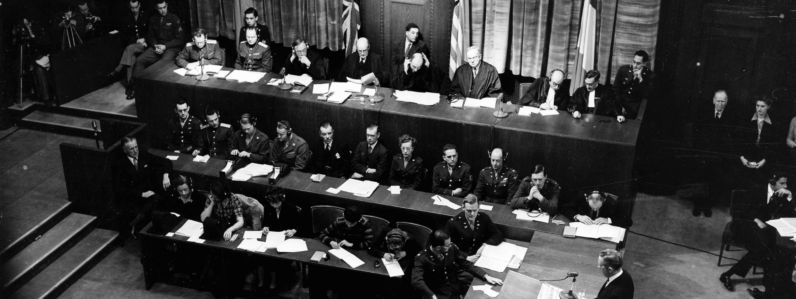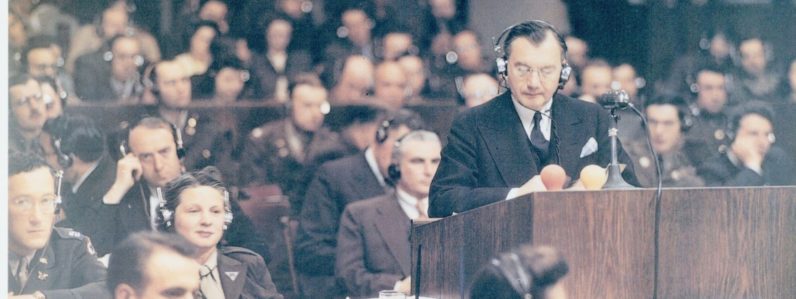I Can Go Home Again, by Arthur Gray, Powell. Chapel Hill: The University of North Carolina Press, 1943, $3.00.
Judge Powell has written a lively story of his life as a lawyer in a county seat in southwest Georgia. It is a self-portrait of the disappearing country lawyer and it will delight members of the profession wherever they happen to practice. To squeeze this book into a review would destroy its charm. It is a garland of dainty flowers from the southern countryside and although one can bale straw, he can only crush a bouquet.
The book does not pull and tug at the reader with propaganda does not depress him with dark prophecies, does not lecture or patronize him. Judge Powell tells his story for love of the story and for love of the telling. He tattles on himself with impish candor and on his neighbors with charity. His style is direct and salty, his characters are often colored and always colorful. Some of the stories are as earthy as life on the land is earthy.
Judge Powell's book reminds us who come from rural backgrounds that our way of life was much the same all over America. Judge Powell and I are a generation apart, but country living changed little between his youth and mine. Its real transformation came with the automobile, the gasoline engine, the telephone, radio, electric power, and mechanization, all of which were unavailable on the farm when I was born. He shows a middle-class South, little known to literature. Romantic writers portray the rare, spacious and elegant plantation life, while sociological ones emphasize the penniless and squalid life of the poor black and the equally necessitous poor white. Northerners are apt to focus on one or the other, forgetting that in the South, as elsewhere, many belong to neither extreme and that middleclass people shape the life of the country'. As I read Judge Powell's book, his early life in the heart of Rebel territory and mine in typical Yankee domain were so alike that it stirred a faint nostalgia-a homesickness such as the city-bred never will understand.
Our homes were warmed and our food was cooked with wood stoves. There was no plumbing and no sewers, of course, but we managed pretty well without. Baths were available in a washtub in the kitchen on Saturday nights only.
The churches were the centers of a social life and influence that was distinct from any doctrinal influence. The function they performed in the rather lonely life of the country cannot be known to those who talk scornfully about the "Bible belt." Country people did read the Bible, and many took it literally. Some were narrow, harsh judges of their fellow men -foes of pleasure. The revival meeting was an emotional· outlet for many who grappled hysterically for a personal Savior more because of the emptiness of their lives than because of their sins. But in spite of all this the church did hold out an inducement to decent life, and there was nothing that fully took its place. Judge Powell tells of the foibles and littleness of many of his pious neighbors in a matter-of fact way; but when he laughs, it is with his people, never at them.
The country doctor, with the lawyer, the teacher, and the preacher, made up the ''learned professions," and of these the doctor was closest to the family hearthstone. He carried his medicines and a pair of forceps to pull aching teeth, if his wife had not borrowed them for some domestic purpose, such as tightening the nuts on the sewing machine. Children were born at home instead of at hospitals and were attended by neighborly but untrained women, made wise by experience. A birthplace was a hallowed spot to both mother and child. In earlier days, before such service had become professionalized, the country family buried its own dead. Loving but unskilled hands closed the eyes and "laid out" the body in the "parlor." Family and friends watched in hushed grief and tiptoed in and out as if in fear of disturbing sleep. The "mortician" and the "funeral home" are later developments. Keeping of the family plot in' the little graveyard was not delegated to corporate trustees but was a personal duty. Of course, we boys were not superstitious- but it was a distinct handicap to a girl to live where one had to pass the cemetery to take her home.
The somewhat solitary and. elemental life produced a rampant individualism and a strong attachment to place-to place of birth, to the place where one lived. Local feeling was strong and there was suspicion of the stranger until he proved himself. These people lived close to their own hearths and kept the company of their own thoughts and feelings. They respected industry, achievement and decency. They became stoical. They had a decent reserve about expression of their affections and did not place their griefs on exhibition. They distrusted those who made display of sentiment as being shallow and· insincere, an instinct that· was not without foundation. Whatever blows fate dealt to them they did not whine. And for competence and sheer ability to take care of themselves and to make a little go a long way they have had no equals.
Arthur Powell in such surroundings had a carefree boyhood, as most country lads do. He does not claim to have been precocious and had no abnormal zeal for hard work. He farmed a little but candidly disliked farm work, and even managed to shirk milking the family cow. He enjoyed pranks and "practical jokes." He loved the flowers and the fields and the creeks -and the girls. He was a gay youth as those who know him now would suspect. He was sent away to school, joined a fraternity, and studied some. He fell in love with a whole girls' academy. He joined the Baptist Church, but was expelled for dancing. He doesn't exactly admit ·it but I gather that the girls he danced with also thought his dancing a sin. · But the tunes of the country fiddler and the call of the quadrille echo faintly throughout the book. He was readmitted and expelled from the church time and again, which reminds me of· the old lady at home who said she had been "a Christian for forty years- off and on." In this southern community, as in its northern counterpart, the school-teacher stimulated in young men a romantic as well as an intellectual interest. Judge Powell's partner in the permanent and beautiful romance of his life was a country school-teacher.
Life, however, was not all play. Youth even then had certain cash requirements which it was a matter of pride to supply for one's self as early as possible. Powell taught school for a time, set type on a country newspaper, reported for it, and did a little surveying. But his father was a lawyer, and young Arthur's ambition always was to be a lawyer too. He became an apprentice and ''read law" in the office of his father.
The elder Powell had joined the Confederate Army at nineteen and ·lost a leg at Petersburg, Va. When the surrender came, he went back to Georgia, penniless, one-legged, ill clad and hungry, to find that the death of his father had left on his hands an invalid mother and six younger brothers and sisters. He had little education and never ceased to be a “versatile speller." But he had determination, industry, and an intuition for law. After a little "reading" of law, the first time he was ever-in court he was admitted to the bar. Then he waited for clients, and that impoverished country yielded a poor crop: But he tried lawsuits with zeal, he selected jurors with an instinct for sympathetic minds, he had a knack for making them see what he, saw in a case, and he was willing to take his pay in pork or potatoes or in good will. Under him our author served a long and valuable apprenticeship.
Judge Powell was admitted to rural law practice fairly well qualified, as lawyers of that time went. The law at work in lower rural courts, often presided over by laymen, is not like the law on dress parade in high courts. The justice of peace courts had no use for the exhaustive research and footnoted learning in which modern law schools and their progeny delight. A Georgia lawyer expressed its prevailing spirit in advice to young lawyers. "A knowledge of the law," he said, "is a bad thing for a lawyer. It may be against him and give him less confidence in his case. Study the facts and the jury, and the law will take care of itself." These informal courts were not always models of neutrality. Young Powell clerked for a lower court judge who divided labor with him on this basis: "You draw the accusation and question the witnesses, and I'll do the convicting.” Judge Powell adds, "I did; and he did." The judgments of such courts apply not law in the books but the law as it lives in the untrained minds of the community. Such people do not hesitate to tell a judge if they do not like his decisions, and I have known justices of the peace who did not risk disapproval, but consulted with neighbors pretty generally before decisions were made. But usually without asking they knew how the community felt, and the decision represented its collective idea of the decent thing. And generally it was not far off.
It is not, of course, to be understood that all has been contentment and brotherly love in the towns and hamlets. There were quarrels between neighbors and feuds between families. Nowhere were litigants more stubborn over such small values. One's prestige and pride, as well as his money, were at stake when he set out "to have the law on" another. The lawsuit was no private affair. The whole neighborhood went, and took sides, and woe to the lawyer who gave a dull performance!
Arthur had experience with commerce in all forms; as country lawyers do in a small way. He organized and became a director of a telephone company and a bank and was a part-time business man. He was never a specialist. Always he was a lawyer, a "courtroom" lawyer, a general practitioner who would and did try every kind of case and in any kind of court.
Such law practice always has had a certain kinship to politics. Judge Powell stuck pretty close to the law, however, became known throughout the state as a wise man and a good lawyer, and was elected to the high bench of Georgia. He is frankly a conservative in politics and fears the New Deal- any New Deal. He knew the leading men of his time on intimate terms. One to whom he pays a high tribute is a long-time friend, also a stalwart Georgia country lawyer and a just judge, now Senator Walter George.
One of the-most dramatic chapters of the book describes Gov. John M. Slaton of Georgia and his handling of the Frank case. It is a lesson in civil liberties. Gov. Slaton's part was noble, courageous, and in the best American tradition. Gov. Slaton is a conservative but his conduct in this matter illustrates what John Stuart Mill meant when he urged his fellow liberals to study their conservative adversary, Coleridge, remarking that "we should pray to have enemies who make us worthy of ourselves."
Frank was a factory manager and a Jew. Mary Feagan, a local girl employed by him, was found murdered and probably raped. This combination of unfortunate circumstances kindled racial hatreds; they were fanned unwittingly by friends of the Jew and maliciously by his enemies. Fear and hate spread from Jew to Catholic, to aliens, to Negroes; they swept from Atlanta to all Georgia and from there to all the South; they revived the Ku Klux Klan. How it and the low passions it thrived upon were capitalized by opportunist politicians is a sad tale, sadly told. Frank was convicted, and a divided state Supreme Court affirmed. Petition for pardon was made to Gov. Slaton, who was finishing his second term a most popular governor, with every political prospect and with wealth to make continued public service possible. The people, knowing the ways of the American politician, accepted the prediction that he would grant a few days' reprieve "to study the case" and thus throw the matter into the lap of the incoming governor.
When word got about that he was actually giving the case of the Jew earnest consideration, anger rose. The governor plodded through the record and with a lawyer's insight became convinced that Frank certainly had not been proved guilty and probably was innocent. Slaton commuted the death sentence to life imprisonment in the belief that facts soon would come out to support a full pardon and with fears that if it were granted before such developments Frank might be lynched. He rightly judged the public temper. On news of the commutation a mob broke into the Milledgeville penitentiary, overpowered the guard, and hanged Frank.
The mob spirit also turned on the governor. The guard was called to keep order. He was living at his own home in Atlanta, surrounded by spacious grounds and trees and shrubs. The mob milled about for three nights and at last seventy-five men, trying to creep up on the place with arms, blackjacks, and dynamite, were surrounded and captured by the guardsmen. The governor refused to swear out a warrant for them. He said they were poor, deluded men and told them to go home to their families, who needed them.
Slaton was ruined in politics. He knew he would be ruined when he acted. He told Mrs. Slaton of his belief that Frank was innocent and suggested the danger to himself and to her of acting on it. She told him she would rather be the widow of a brave and honorable man than the wife of a coward. Judge Powell says he knows facts that he is not at liberty to reveal while certain men live, but which he will make available to posterity, which demonstrate Frank's innocence.
It should be remembered that the man John Slaton ruined himself to save was not one of his own class. Between Frank and Slaton stretched a social chasm as wide as any that can separate men in this world. But across that gap the conscience of an American lawyer demanded just and fair play, the training of an American lawyer detected its absence, and the strong arm of a lawyer-governor reached to save a victim. Gov. Slaton has never tried to capitalize his sacrifice, never voiced grievance or resentment, never played the martyr. He might have saved his own career had he stooped to utilize the mob spirit as did a French Revolutionary leader of whom the story is told that he looked out from a drawing room where he was being entertained and exclaimed, "There goes the mob; I must follow it. I am its leader." Many would have looked upon the occasion with Pickwickian opportunism: " 'It is always best on these occasions to do what the mob do.' 'But suppose there are two mobs,' suggested Mr. Snodgrass. 'Shout with the largest,’ replied Mr. Pickwick!” -But John Slaton preferred his self-respect. He is honored today as a lawyer who in high place and at great cost kept faith with the best traditions of his profession.
Thus, while the book does not scold or exhort, it does teach. It is one of the social documents of our time. We see the South slowly rising to its feet after the devastations of war and the corruptions of a peace of which no northerner is now proud. But Judge Powell doesn't rub that in. There isn't a trace of ill will in it from beginning to end.
Judge Powell does not avoid the tragedy and pathos of the colored race. Its clashes with the whites are told simply and without smugness or bitterness; and the weaknesses of both races lighten the tale at times, but sometimes darken it. He does not offer solutions for race tensions which all too likely admit of no panaceas, but he does exemplify the good will without which no progress is possible.
Thus Southern life is seen through the penetrating eye of the county seat lawyer, counsellors to railroads and to Negroes, to bankers and to poor whites, who always gave to each the best there was in him-and was willing to admit that his best was good. That lawyer has been an American institution-about the same in South and North and East and West. Such a man understands the structure of society and how its groups interlock and interact, because he lives in a community so small that he can keep it all in view. Lawyers in large cities do not know their cities; they know their circles, and urban circles are apt to be made up of those with a kindred outlook on life. But the circle of the man from the small city or town is the whole community and embraces persons of every outlook. He sees how this society lives and works under the law and adjusts its conflicts by its procedures. He knows how disordered and hopelessly unstable it would be without law. He knows that in this country the administration of justice is based on law practice.
Paper “rights" are worth, when they are threatened, just what some lawyer makes them worth. Civil liberties are those which some lawyer, respected by his neighbors, will stand up to defend. Any legal doctrine which fails to enlist the support of well-regarded lawyers will have no real sway in this country.
It has been well said that "The life of the law has not been logic: it has been experience." The experience that gave life to our judge-made and statutory law, at least until the last few years, was this type of country life. From such homes came the lawyers, the judges and the legislators of the nineteenth century. Their way of living generated independence and amazing energy, and these country boys went to the cities and dominated the professions and business as well. They controlled the county court houses and the state houses arid the nation's capital as well, and they weighed legal doctrines, political theories, and social policies in the light of the life they knew. If we would understand the product of those courthouses and state houses, we must understand that life and the impressions it made on the minds of men. Much of the changing trend of law and of political and social policy is due to the declining number of men who have shared this experience. More men now come to the professions from the cities, fewer from farms.
The county-seat lawyer and the small-town advocate are pretty much gone, and the small-city lawyer has a struggle to keep his head above water. Control of business has been concentrated in larger cities and the good law business went to the city with it. The lawsuit has declined in public interest before the tough competition of movie and radio. Most rural controversies are no longer worth their cost to litigate. Much controversy has now shifted to the administrative tribunal, and the country lawyer hates it and all its works.
But this vanishing country lawyer left his mark on his times, and he was worth knowing. He "read law" in the Commentaries of Blackstone and Kent and not by the case system. He resolved problems by what he called "first principles." He did not specialize, nor did he pick and choose clients. He rarely declined service to worthy ones because of inability to pay. Once enlisted for a client, he took his obligation seriously. He insisted on complete control of the litigation- he was no mere hired hand. But he gave every power and resource to the cause. He identified himself with the client's cause fully, sometimes too fully. He would fight the adverse party and fight his counsel, fight every hostile witness, and fight the court, fight public sentiment, fight any obstacle to his client's success. He never quit. He could think of motions for every purpose under the sun, and he made them all. He moved for new trials, he appealed; and if he lost out in the end, he joined the client at the tavern in damning the judge - which is the last rite in closing an unsuccessful case, and I have officiated at many.
But he loved his profession; he had a real sense of dedication to the administration of justice; he held his head high as a lawyer; he rendered and exacted courtesy, honor, and straightforwardness at the bar. He respected the judicial office deeply, demanded the highest standards of competence and disinterestedness and dignity, despised all political use of or trifling with judicial power, and had an affectionate regard for every man who filled his exacting prescription of the just judge. The law to him was like a religion, and its practice was more than a means of support; it was a mission. He was not always popular in his community, but he was respected. Unpopular minorities and individuals often found in him their only mediator and advocate. He was too independent to court the populace - he thought of himself as a leader and lawgiver, not as a mouthpiece. He "lived well, worked hard and died poor." Often his name was forgotten in a generation or two.
It was from this brotherhood that America has drawn its statesmen and its judges. A free and self-governing Republic stands as a monument for the little known and unremembered as well as for the famous men of our profession.







